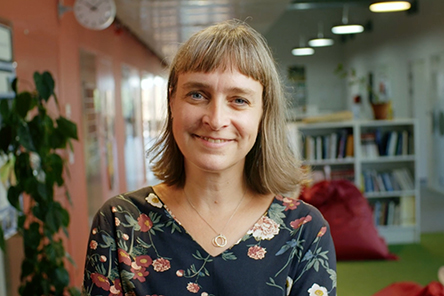Humanities important in a world of climate change

Creating a sustainable society involves more than earth metals, nuclear power and smarter grids. For Nina Wormbs, professor of history of technology, it is also about the humanities and is particularly important in climate change.
"Concepts such as progress, sustainability and technology will be redefined. This is where the insights of humanistic knowledge about history, ideas, values and conflicts are needed to balance and enrich the understanding of the world," she says.
Outstanding research environment
KTH has long been involved in research that studies how technology and science are produced and received in society and how we relate to the environment that gives birth to us.
Within the humanities research, for example, there is ongoing research into how discussions about energy and resources were conducted during Sweden's industrialisation, where parallels can be drawn to today's discussions where different types of energy are set against each other.
KTH's historians and humanists constitute a prominent research environment with unique characteristics. In the 2000s, broad interdisciplinary collaborations took place with a strategic focus on research on thematically defining challenges such as climate, environment, energy, infrastructure and natural resources. In the 2010s, the international visibility of the environment grew. KTH's historians took a Swedish leadership role in the ‘new humanities’ that began to take shape worldwide to respond to growing global challenges and contribute to a responsible societal transition.
A donation in 2011 enabled a new platform for integrative experimental and socially engaged humanities, the KTH Environmental Humanities Laboratory. With the help of the donation, international collaborations could be further developed. Since then humanities projects focusing on climate, environment and energy have been created with external revenues of more than a quarter of a billion SEK. In addition to Swedish research councils and foundations, the prestigious European Research Council (ERC), which has funded three historic projects at KTH, is unique for humanities environments in Sweden.
Recently, the Centre of Excellence for Anthropocene History at KTH has been made possible by funding from the Swedish Research Council and is the only one of its kind in the world. Here, researchers will develop a completely new type of basic research focusing on the elements of the atmosphere, hydrosphere, climate, snow and ice, oceans, forests and minerals, which are becoming part of human history and even more so in the future.
Understanding context
Sustainability requires an understanding of context, a capacity for reflection and a broad knowledge of many fields, not least historical. Both research and education are needed. In a multi-year project funded by the Wallenberg Foundation, the KTH Future Humanities Initiative, researchers attempt to translate innovative humanities research into useful elements of KTH's educational programmes and, in the long term, also for professional training in other areas. The project has deliberately been built as an initiative under Agenda 2030 to meet KTH's third century in 2027 with educational opportunities that meet new and greater demands on the professions of technology and civil engineering that can make effective and responsible contributions to the societal transformation that is necessary for Sweden to meet the global goals and maintain its position as a future nation.
"Historians sometimes talk about what we do under the motto ‘wiser engineers’. Sustainable knowledge requires education, which can provide wisdom and a developed judgment. These qualities can characterise KTH's third century," says Nina Wormbs.
